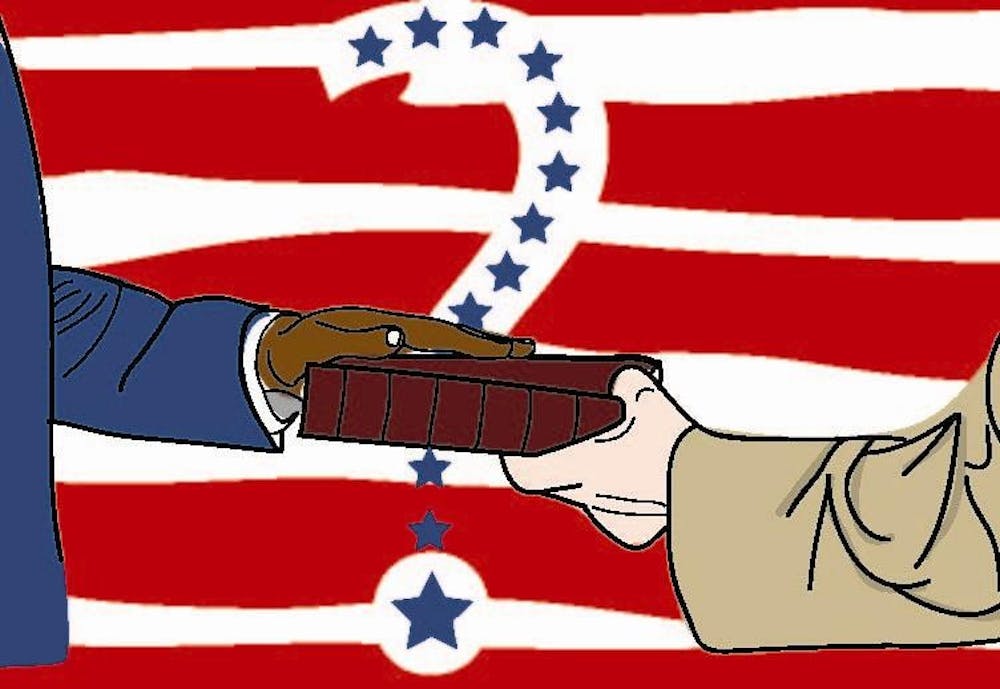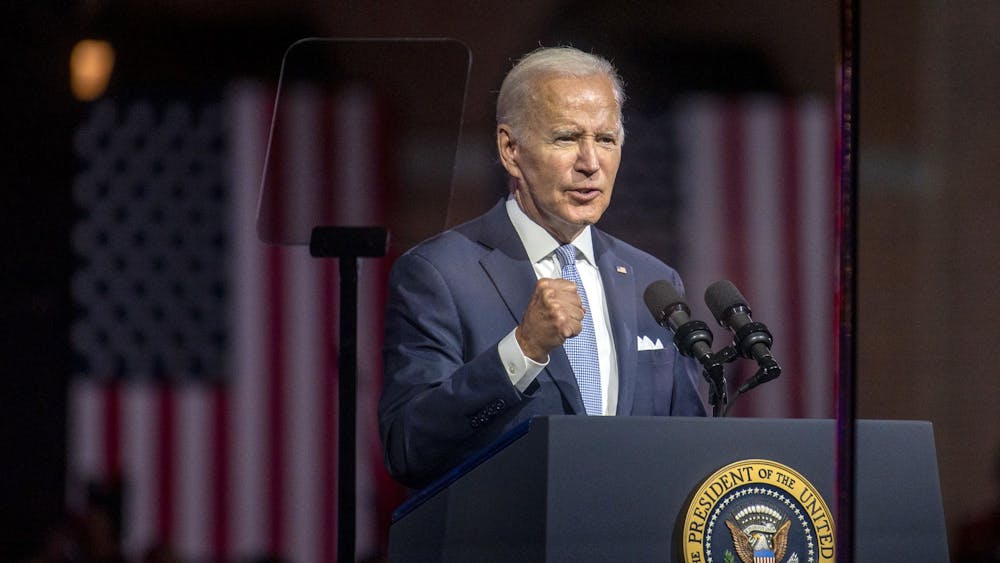Junior Tiffany Fick knows when America will really be ready for a black president.
Fick, president of the Black Student Union, said when racism is really gone, “he doesn’t have to be Barack Obama ‘the first black president,’ but just Barack Obama, ‘the president.’”
There are few times in history when race did not matter: the Olympics and 9/11, said Eric Love, director of diversity education at IU.
“When 9/11 happened, for a brief moment, we were all Americans – we rallied together,” Love said. “But shortly after that it was business as usual.”
Business as usual means racism still exists in America, Love said. Which is why, almost 50 years after segregation and more than 140 years since slavery ended, he is still not sure if America is ready for a black president.
BEING BIRACIAL
Barack Obama is the son of a white mother from Kansas and a black father from Kenya.
But the presidential Democratic nominee is almost always referred to as the “black” candidate, despite the fact he is equally white and black.
Rashawn Ray, a Ph.D. candidate in the sociology department, said Obama’s racial identity is an example of how America lives by the one-drop rule. Just as during times of slavery, anyone with one drop of black blood was considered black.
“Unfortunately it’s a disconnect between the correct way to do it and the way that’s always been done,” Ray said. “That’s why he’s considered black. That’s why he has to play up his white side. He is considered by most to be the black candidate because though we’re living in 2008, we still have the one-drop rule.”
Biracial students such as junior Aaron Slinker, who supports Obama, said this isn’t offensive, but simply typical. Just as in times of slavery or segregation, biracial people faced discrimination too.
“I’m half-white, but I still identify mostly as black,” Slinker said. “When it comes to issues I feel like I’m more affected as black man.”
Love agreed and added that to call someone black who is actually biracial is a prime example of “business as usual” in America: People try to simplify others’ identities.
“I think on one hand it’s OK, but on the other hand it kind of diminishes who (Obama) is as a person. It denies his own humanity,” Love said. “We don’t fit in the boxes that we like to put each other in.”
Slinker added that to share a race with someone who is running for president automatically makes that candidate more relatable.
“He was raised by the white side of his family. I relate to that because I had the exact same experience,” Slinker said. “He can relate to me when he’s making these decisions, and he’s not just some wealthy politician who doesn’t really care.”
RACE IS A FACTOR, BUT HOW BIG A FACTOR?
In a year when many say color matters, voters must wonder how much race might come into play Tuesday.
Although Obama leads most national polls, some experts worry about the Bradley effect, in which a black candidate will lead strongly in polls up to Election Day but then lose the election. Others, like many black students and experts at IU, worry that some people just won’t get over Obama’s race.
Ray said though progress has been made in recent history, race remains a huge part of some voters’ decisions. He agreed with many race scholars that there’s a difference between expressing support for a black candidate and actually casting your vote for that candidate on Election Day.
“The glass is half full, but it’s also half empty,” Ray said. “I’m cautiously optimistic that although race plays a very big factor, most individuals are trying to move past that.”
In fact, many said they believe Obama would soar in polls without the race factor.
“We’re only 40 or so years out of instituted racism,” Slinker said. “So there’s still a lot of people around from that era who wouldn’t feel comfortable with a black man in that position.”
Justin P. Hill, chairman of IU Students for John McCain, said he hopes voters will look at Obama the same way he does: asking themselves if they trust him and if he qualifies for the job.
“We should only make our decision based upon who is the most qualified candidate, and I would hope that every American makes their decision based on that,” he said. “We hold ourselves to a higher standard.”
Hill said he doesn’t know how much racism will affect this election, but he hopes if McCain wins, people will recognize it as a victory for the better candidate instead of only racism.
But Ray said if Obama were to lose, many people would look at it as a “silent, conscious type of acknowledgement that race still matters as much as it does.”
Love expressed worry about how those of different race perceive Obama and his success as a biracial man.
“I think there’s people who absolutely will not vote for Barack Obama because he’s black,” he said. “There’s a saying that when you’re successful, you’re half as black. When you fail you’re twice as black. I think for the most part, yes – when you’re successful you’re an exception. You’re not quite as black. No, black people achieve all the time.”
TRANSCENDING RACE
Many supporters of Obama agree he brings together voters of different colors, sexual orientations and even religious beliefs. In his acceptance speech in August at the Democratic nomination in Denver, Obama said:
“We may not agree on abortion, but surely we can agree on reducing the number of unwanted pregnancies in this country. ... I know there are differences on same-sex marriage, but surely we can agree that our gay and lesbian brothers and sisters deserve to visit the person they love in a hospital and to live lives free of discrimination.”
Calling for a common purpose as Americans certainly has been a theme on the campaign trail, and it’s a theme people embrace, Love said.
“I think that his character is more important ultimately than his race,” Love said. “Other people are saying ‘Wow, I can aspire to be that.’”
Slinker said he agrees Obama put race aside because he doesn’t want to make it a bigger deal than it already is.
“He doesn’t want to be seen as the black candidate,” Slinker said. “He just wants to be seen as the best candidate.”
Before the black vote even mattered, whites said Obama was credible, Fick said.
“I think that makes a big difference in how people view him,” she said. “He’s a hardworking person who’s kind of like an American Dream for us. So a lot of people look up to him because that’s something that they want to be.”
But do blacks only support Obama on the basis of his race and not issues? Most answer no, agreeing Obama has something more than just his race that appeals to black voters.
“Jesse Jackson tried before, but he didn’t have the support and he was black. So obviously Barack Obama has something else to offer besides just being black and running for president,” said sophomore Jasmine Collins, who is biracial. “The people who have been running this country have made some errors. I think whether Barack is black or white, somebody needs to come and fix it.”
Fick said race is not the only issue that draws black voters to Obama, but it clearly plays a part. At a Black Student Union meeting, Fick said some members said they were voting for him because of his race, and others said his issues play a part in their decision as well.
“Not all black people think all black people are qualified for the job,” Fick said. “I’m not an Obama supporter because I’m black, and I’m not an Obama supporter because I’m a Democrat.”
IF HE WINS...
If Obama is inaugurated in January, it would mean more to the black community than some of its members said they could imagine.
“It’s almost indescribable if he were to win,” Love said, tearing up. “It would mean things on so many levels ... pride in our nation that we are overcoming some hurdles of race.”
Collins said while growing up, blacks were only mentioned in regards to slavery and segregation in her history classes. But if Obama wins, the word “hope” might become more than just a campaign slogan.
“You never hear about black people being a part of the American Dream. ... Martin Luther King, he talked about a day like this, where we can come together and not have to worry about whether we’re black or white,” Collins said. “I would feel empowered. As an African-American, I’m a minority. As a woman, I’m a minority. As an African-American and white woman, there’s not a lot of people who I can look up to and be like ‘Oh, they made it.’”
IU community reflects on race’s role
University experts, students question whether voters will look beyond color

Get stories like this in your inbox
Subscribe




